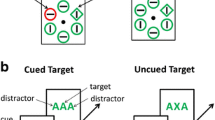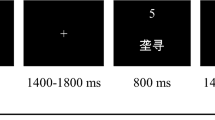Abstract
Our goal in this paper was to examine the processes that give rise to action slips. Procedures used to examine implicit memory and automatic processes were found to be unsatisfactory. However, the process-dissociation procedure proved useful for examining the contribution of the automatic and controlled processes underlying performance. The procedure was used in conjunction with a Sternberg memory-search task to examine the effects of set size, response speed, and stimulus-response mapping on controlled and automatic processes. The formulation allowed us to predict accurately how subjects would perform in a varied mapping condition. Moreover, set size and response speed were found to influence the controlled search process, but to leave the automatic influences unaffected. Stimulus-response mapping, on the other hand, was found to lead to probability matching in the automatic processes; this pattern was found to remain constant across changes in set size and response speed.
Similar content being viewed by others
References
Estes, W. K. (1976). The cognitive side of probability learning. Psychological Review, 83, 37–64.
Hasher, L., & Zacks, R. T. (1979). Automatic and effortful processes in memory. Journal of Experimental Psychology: General, 108, 356–388.
Hintzman, D. L. (1976). Repetition and memory. In G. H. Bower (Ed.), The psychology of learning and motivation (pp. 47–91). New York: Academic Press.
James, W. (1890) The principles of psychology. New York: Holt.
Jacoby, L. L. (1991). A process dissociation framework: Separating automatic from intentional uses of memory. Journal of Memory and Language, 30, 513–541.
Jacoby, L. L., & Brooks, L. R. (1984). Nonanalytic cognition: Memory, perception, and concept learning. In G. H. Bower (Ed.), The psychology of learning and motivation (pp. 1–47). New York: Academic Press.
Jacoby, L. L., Jennings, J. M., & Hay, J. F. (in press). Dissociating automatic and consciously-controlled processes: Implications for diagnosis and rehabilitation of memory deficits. In D. J. Herrmann, M. K. Johnson, C. L. McEvoy, C. Hertzog, & P. Hendel (Eds.), Basic and applied memory research: Theory in context, Hillsdale, NJ: Erlbaum.
Jacoby, L. L., & Kelly, C. (1992). A process-dissociation framework for investigating unconscious influences: Freudian slips, projective tests, subliminal perception, and signal detection theory. Current Directions in Psychological Science, 6, 174–179.
Jacoby, L. L., Toth, J. P., & Yonelinas, A. P. (1993). Separating conscious and unconscious influences of memory: Measuring recollection. Journal of Experimental Psychology: General, 122, 139–154.
Lindsay, D. S., & Jacoby, L. L. (1994). Stroop process dissociations: The relationship between facilitation and interference. Journal of Experimental Psychology: Human Perception and Performance, 20(2), 219–234.
Logan, G. D. (1988). Towards an instance theory of automatization. Psychological Review, 95, 492–527.
Logan, G. D. (1990). Repetition priming and automaticity: Common underlying mechanisms. Cognitive Psychology, 22, 1–35.
Norman, D., & Shallice, T. (1986). Attention to action: Willed and automatic control of behavior. In J. Davidson, R. Schwartz & D. Shapiro(Eds.), Consciousness and self-regulation. New York: Plenum.
Reason, J. (1979). Actions not as planned: The price of automatization. In G. Underwood & R. Stevens (Eds.), Aspects of consciousness, Vol. 1, Psychological issues (pp. 67–89). New York: Academic Press.
Reber, A. S. (1989). Implicit learning and tacit knowledge. Journal of Experimental Psychology: General 118, 219–235.
Richardson-Klavehn, A., & Bjork, P. M. (1988). Measures of memory. Annual Review of Psychology, 39, 475–543.
Roediger, H. L., & McDermott, K. B. (1993). Implicit memory in normal human subjects. In H. Spinnler & F. Boller (Eds.), Handbook of neuropsychology (Vol. 8). Amsterdam: Elsevier.
Schneider, W., & Shiffrin, R. M. (1977). Controlled and automatic human information processing: I. Detection, search and attention. Psychological Review, 84, 1–66.
Shiffrin, R. M., Dumais, S. T., & Schneider, W. (1981). Characteristics of automatism. In J. Long & A. Baddeley (Eds.), Attention and performance IX, 223–238.
Shiffrin, R. M., & Schneider, W. (1977). Controlled and automatic human information processing: II. Perceptual learning, automatic attending, and a general theory. Psychological Review, 84, 127–190.
Sternberg, S. (1966). High-speed scanning in human memory. Science, 153, 652–654.
Yonelinas, A. P. (1994). Receiver operating characteristics in recognition memory: Evidence for a dual process model. Journal of Experimental Psychology: Learning, Memory, and Cognition. 20, 1341–1354.
Yonelinas, A. P,, & Jacoby, L. L. (in press). Dissociations of processes in recognition memory: Effects of interference and response speed. Canadian Journal of Experimental Psychology.
Author information
Authors and Affiliations
Rights and permissions
About this article
Cite this article
Yonelinas, A.P., Jacoby, L.L. Dissociating automatic and controlled processes in a memory-search task: Beyond implicit memory. Psychol. Res 57, 156–165 (1995). https://doi.org/10.1007/BF00431277
Issue Date:
DOI: https://doi.org/10.1007/BF00431277




